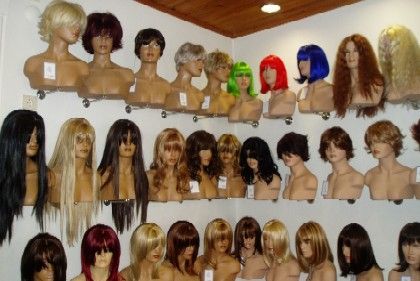Iva Hromkova
A recent decree by the Board of High Education (YOK) relaxed the ban on headscarf wearing women students to attend classes at the universities. While the ban was still in force, students were circumventing it by wearing wigs to enter classes in order to obey what they termed as the prerequisite of their Islamic faith and continue their studies at the same time.
To find out how the YOK decree would affect the wig sellers we visited several shops lining the main street running from Taksim to Sishane and interviewed headscarf wearing students on the campus.
Murat Ozdemir, 29, owner of a store with a large selection of wigs near Taksim was confident that the YOK decree would not have a notable effect on his sales. “Most women come to buy wigs at the beginning of the school year. I don’t think some law would change this habit anytime soon,” he said.
The wig business is really not as big as one would expect, he pointed out. Selling special wigs called “tesettur peruk”, according to Ozdemir, is just a small part of the artificial hair business.
Headscarf wearing women students confirmed Ozdemir’s comments. “If we are not allowed to wear our hijab (headscarf) at a particular school, we just choose another one. We don’t want to wear wigs,” said a student at Bilgi campus.
“We have never worn a wig and we even don’t know anybody who does,” she added.
The headscarf ban still remains in government offices for employees.
Economic crisis is more effective
Another wig seller, Kasim Celik, 34, declared that the economic crisis is more effective in his sales than the relaxation of the headscarf ban for university students.
“If the headscarves are allowed, women will not need wigs anymore. But they may decide to wear a clip-in hair extension,” said Celik. Some of his customers buy straight, long hair extensions to make their hair look longer.
Celik said that Muslim women wear wigs so that their own hair cannot be seen in public places like government offices and even some companies that do not allow their personnel to work with headscarves.
Most of these ladies are conservative; they buy wigs only for religious reasons. They usually choose wigs with the same color of their hair. They don’t want to spend too much money so they usually buy synthetic hair. Favorite wigs are of chestnut shade and a length to cover woman’s neck and shoulders,’ he explained.
The wigs are imported from South Korea. Because of their synthetic material, they do not last more than a year. Prices of such wigs depend on their length and range from 50 to 85 liras. Natural wigs made of human hair are much more expensive but they last much longer than the synthetic ones.
It seems that the relaxation of the headscarf ban at the universities would not have a considerable effect on the wig sales; but the debates over whether covering women’s hair is a prerequisite of Islam will definitely continue for a long time to come.







